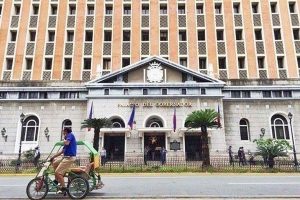By Erika Mae P. Sinaking
THE Commission on Elections (Comelec) has intensified its scrutiny of campaign-finance compliance simultaneously pursuing investigations into two sitting senators over alleged Statement of Contributions and Expenditures (SOCE) violations and initiating a broad crackdown on government contractors.
Comelec Chairman George Erwin M. Garcia on Wednesday said the poll body will issue a show-cause order (SCO) to Senator Rodante D. Marcoleta next week after identifying inconsistencies between his SOCE and his Statement of Assets, Liabilities, and Net Worth (SALN).
“The Comelec will issue a show-cause order, so our good senator will have the venue to explain,” Mr. Garcia told reporters in an ambush interview.
He added that the agency must formally document the senator’s explanation rather than rely on circulating discussions online. “It is difficult when everything spreads on social media — people might think we are not acting.”
Mr. Marcoleta earlier admitted he omitted certain campaign donations from friends who wanted to remain anonymous.
Mr. Garcia said the omission cannot simply be brushed aside, and that election rules require full reporting. “As far as the Comelec is concerned, there are absolutely no exemptions,” he said. “All donations received during the campaign period must be declared and fully laid out.”
The Comelec chief clarified that the agency is not initially focusing on liability but on understanding the factual basis for the omission. “For now, we are not yet looking at liability,” he said. “We want to know the explanation, the reasons behind it.”
“We will examine and balance the evidence against the documents we hold to determine whether to file a case or set the matter aside.”
Under Philippine election law, he said, candidates who knowingly file false SOCEs face penalties that may include imprisonment of one to six years, perjury charges, and possible prosecution for falsification of public documents.
Jesus Nicardo M. Falcis III, lawyer and political analyst said strict donor disclosure is indispensable because it ensures regulators can detect prohibited contributors.
“Knowing who finances a politician is crucial for Philippine democracy. You are not allowed to hide your backers or financiers,” he told BusinessWorld in a Facebook messenger chat.
“If candidates do not disclose their donors, how will the Comelec and the public know if their donor is a foreign entity or a government contractor?” He said.
Transparency about political financiers, he said, is essential to preserve the independence of public officials.
Mr. Falcis said his group’s newly filed complaint against Senator Francis “Chiz” Escudero was meant to accelerate the Comelec’s internal investigation into campaign-finance issues.
“We filed that complaint to introduce a civil society and citizen-advocacy component into the Comelec’s ongoing investigation,” he said. “We believe it is taking too long for them to issue a decision.”
The Comelec is looking into a separate case involving Mr. Escudero, who received a P30-million campaign contribution from top flood control contractor Lawrence R. Lubiano.
Mr. Garcia said Comelec’s Political Finance and Affairs Department (PFAD) has submitted its recommendation, in relation to the ethics complaint, filed by a group of concerned citizens led by lawyer Eldrige Marvin Aceron, against the senator.
“The PFAD has submitted its recommendations, and the six en banc members will review them according to their own legal interpretations. It won’t be later than Wednesday of next week,” he said.
The law explicitly prohibits candidates from receiving donations from individuals or companies with active government contracts, but Mr. Escudero’s office and Mr. Lubiano, president of Centerways Construction and Development, Inc., maintain that the funds came from Mr. Lubiano’s “personal money, not the company’s.”
The matter is now awaiting resolution by the commission’s en banc.
Mr. Falcis said that when facts and admissions are clear, the Comelec must act promptly.
In a separate chat, election-law and governance expert Carlo G. Africa said SOCE transparency is directly linked to the public’s constitutional right to informed political choice.
“People must have as much information as possible about all candidates,” he told BusinessWorld. “How much a candidate spent and who specifically donated are critical pieces of information that can influence voter decisions.”
He said donor transparency also matters because it shapes voter judgment. “If people had known that a candidate received donations from a mining company, those against mining could have chosen someone else.”
Mr. Africa warned that weak enforcement of disclosure rules contributes to a long-standing cycle in which corruption fuels election outcomes.
“Comelec lacks the resources, personnel, training, and permanent investigative offices needed to effectively pursue cases,” he said. “And its budget is controlled by the very officials who benefit from the status quo.”
Mr. Garcia said the commission is committed to moving forward with all investigations, whether involving elected officials or government contractors. “For complete transparency and accountability, we will do this,” he said.

